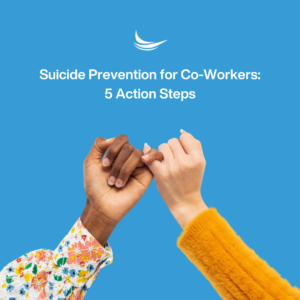Suicide Prevention for Co-Workers: 5 Action Steps
 The death of a co-worker can come as an unexpected shock, especially when they have died by suicide. If you are aware that a colleague is struggling, you can make a significant impact in helping them get the care they need. Awareness of potential warning signs can help alert you if a colleague is at risk for suicide.
The death of a co-worker can come as an unexpected shock, especially when they have died by suicide. If you are aware that a colleague is struggling, you can make a significant impact in helping them get the care they need. Awareness of potential warning signs can help alert you if a colleague is at risk for suicide.
Examples of warning signs from the Suicide and Crisis Lifeline include talking about wanting to die or kill themselves, being a burden to others, or feeling trapped or in unbearable pain. There may be more indirect statements such as “What is the point of living my life like this?” Behavioral and mood changes may include acting anxious or agitated, behaving recklessly, extreme mood swings, lack of engagement in work, sleep changes, withdrawing or isolating themselves, and increasing the use of alcohol or drugs.
Knowing the warning signs, especially if behaviors are new or have increased as well as signs that seem related to a painful event, trauma, loss, or stressful change are tell-tale signs. It may be easier to recognize the warning signs in a friend or family member with suicidal thoughts than in a co-worker, especially when a lot of your interactions may be remote.
The International Association for Suicide Prevention (IASP) reminds us that it is important to connect with someone that you trust. For many people, this includes a co-worker; however, co-workers often struggle with knowing how to reach out for support due to fear and stigma surrounding talking about suicide (especially at work). Co-workers may also minimize symptoms due to concerns about job performance and job security.
As a co-worker, you may not know what to say or how to reach for support from a colleague or manager. Perhaps someone at work knows that you are struggling but is not aware of the extent. Reaching out to connect for support may be more subtle such as a request to “check in” or an expression of painful thoughts or feelings, without necessarily disclosing any suicidal thoughts or feelings. For example, “When you get a chance, can you please contact me? I could use some support right now”. Or “I am struggling; do you have a moment to chat”. When a co-worker is struggling with suicidal thoughts and is in a suicidal crisis, it is important to know how to help someone. Disclosures of suicide risk may come unexpectedly, without warning, and can be stressful to navigate.
The National Suicide Prevention Lifeline is available to provide support and information. In addition to knowing the warning signs, remember these 5 Action Steps #BeThe1To
- Ask
Ask questions in a direct, non-judgmental way. Examples include–Are you thinking about suicide? How can I help? What do you need right now? Do you currently have a plan to kill yourself? Do you have access to the means to carry out this plan? Are you able to keep yourself safe?
- Be There
Listen and be present. If you are unable to be physically present, seek out other supports who may be able to assist.
- Keep Them Safe
Take steps to respond to the information that you have gathered by asking questions that respond to your co-worker’s immediate risk of harm and the severity of the risk. You can call 988 together to support a co-worker in a suicidal crisis. If a person has attempted suicide, is in the process of attempting, or is injured, call 911 immediately and stay with them.
- Help Them Connect
When a colleague is struggling with suicidal thoughts, it is important to help them get connected to support. Connecting someone with suicidal thoughts to national suicide prevention and local 24/7 crisis resources is the first step in response to a suicidal crisis when there is no imminent risk.
As a manager, you can assist with connection to mental health support benefits that may be available through the job such as EAP services, job accommodations, and leave of absence benefits. Providing information on the resources that are offered and ways to get connected, and encouraging the use of appropriate resources can help facilitate connections.
- Follow Up
Take the time to check in with your coworkers to see how they are coping. Let them know that they care about their well-being. Reaching out fosters a sense of connectedness, and many people consider their co-workers to be their family. If you are the one who is supporting a suicidal colleague, consider reaching out for therapeutic support to process and cope.
Resources:
National Suicide Prevention Life: Call or Text: 988 Chat online: https://988lifeline.org/talk-to-someone-now/
The Trevor Project: Call: (866) 488-7386 Text: 678-678 Chat online:https://www.thetrevorproject.org
Mental Health Crisis Services. Text MN to 741741
Metro Area Mental Health Crisis Response
Ramsey: adults: 651-266-7900, children: 651-774-7000
Hennepin: adults: 612-596-1223, children: 612-348-2233
South Central Mobile Crisis Team: 877-399-3040



























